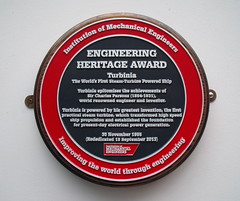Sir Charles Algernon Parsons OM KCB FRS


Sir Charles Algernon Parsons OM KCB FRS
(1854-1931)
engineer, inventor, Fellow of the Royal Society (from 1898), Knight Commander of the Order of the Bath (from 1911), President of the British Association (1916-1919), and Order of Merit recipient (from 1927)
Commemorated on 3 plaques
Turbinia The World's First Steam-Turbine Powered Ship. Turbinia epitomises the achievements of Sir Charles Parsons (1854-1931), world-renowned engineer and inventor. Turbinia is powered by his greatest invention, the first practical steam turbine, which transformed high speed ship propulsion and established the foundation for present-day electrical power generation.
Discovery Museum, Blandford Square, Newcastle upon Tyne, United Kingdom where they was
CA Parsons No5 Generator This was one of the first commercial machines based on the 1884 patent by Charles A Parsons for a steam turbine and used a dynamo as load. Output 65 amps, 100 volts at a speed on 12,000rpm. Presented to Trinity College, Dublin by Gerald Stone, BAI, 1911.
Parsons Building, Trinity College Dublin, College Green, Dublin, Ireland where they was
1855 - 1931 This Library is dedicated to Sir Charles Parsons scientist and engineer who in the XIX century invented and perfected the compound steam turbine The memory of the great is enshrined in books
London House, Mecklenburgh Square (Great Hall, Guildford Street elevation), London, United Kingdom where they was



